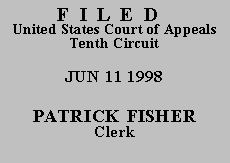

| MUHAMMAD ROBBALAA,
v.
UNITED STATES OF AMERICA |
No. 97-7144
(D.C. No. 97-CV-454) |
Plaintiff subsequently filed a Motion for Extension of Time to Plead, which the district court granted. Robbalaa then filed a Motion to Reinstate for Failure to Appear. Robbalaa argued that the district court should have excused his failure to appear because (1) he had a death in the family requiring travel to Michigan, (2) road construction hampered his travel, (3) he had been unable to secure the services of an attorney, (4) the merits of his complaint outweighed any excusable error in failing to appear; and (5) he promised not to miss any future conferences. (ROA 11). The district court denied Robbalaa's motion:
Plaintiff's stated reasons for his non-attendance are inadequate as no details or particulars are provided regarding the "family death" or the "circumstances of road construction" to enable the court to assess the validity of a conflict or 'inability to attend' argument. Finally, Plaintiff's unsuccessful efforts to engage counsel does not excuse this pro se Plaintiff from attending scheduled court hearings.
(ROA 17 at 2). Robbalaa now appeals.
We review for abuse of discretion a district court's decision to impose sanctions on a party who fails to follow a scheduling order. See M.E.N. Co. v. Control Fluidics, Inc., 834 F.2d 869, 872 (10th Cir. 1987). A district court has the power to dismiss a case for the plaintiff's failure to comply with a district court's scheduling order. See Fed. R. Civ. P. 16(f) & 37(b)(2)(c);(2) E.D. Okla. Local Civ. R. 16.1;(3) Link v. Wabash R.R. Co., 370 U.S. 626, 629-30 (1962).
Robbalaa does not contest the district court's conclusion that he had notice of the conference and failed to inform the district court of his impending absence. Rather, Robbalaa claims that the district court erred by not giving due deference to his pro se status. Although we are obliged to construe pro se pleadings liberally, pro se litigants must "follow the same rules of procedure that govern other litigants." Green v. Dorrell, 969 F.2d 915, 917 (10th Cir. 1992); see also Matter of Baker, 744 F.2d 1438, 1442 (10th Cir. 1984) (noting that while a district court should not punish a party for wrongful conduct by his attorney, if the party himself is at fault, then "the impact of the sanction should be lodged" directly against the party). "Although dismissal is indeed a drastic sanction, we have repeatedly upheld dismissals in situations where the parties themselves neglected their cases or refused to obey court orders." Green, 969 F.2d at 917 (citing cases). The district court allowed Robbalaa a full and fair opportunity to provide sufficient justification for his absence. Because Robbalaa does not argue on appeal that any of the reasons he proffered adequately explain his failure to attend the conference, he has failed to demonstrate any excusable neglect. As a result, we conclude that the district court did not abuse its discretion in dismissing his complaint.
AFFIRMED.
The mandate shall issue forthwith.
ENTERED FOR THE COURT
David M. Ebel
Circuit Judge
*. After examining appellant's brief and the appellate record, this panel has determined unanimously that oral argument would not materially assist the determination of this appeal. See Fed. R. App. P. 34(f) and 10th Cir. R. 34.1.9. The case is therefore ordered submitted without oral argument. This order and judgment is not binding precedent, except under the doctrines of law of the case, res judicata, and collateral estoppel. The court generally disfavors the citation of orders and judgments; nevertheless, an order and judgment may be cited under the terms and conditions of 10th Cir. R. 36.3.
1. Rule 16 provides in relevant part:
(a) Pretrial Conferences; Objectives. In any action, the court may in its discretion direct the attorneys for the parties and any unrepresented parties to appear before it for a conference or conferences before trial.
* * * *
(f) Sanctions. If a party or a party's attorney fails to obey a scheduling or pretrial order, or if no appearance is made on behalf of a party at a scheduling or pretrial conference, or if a party or party's attorney is substantially unprepared to participate in the conference, or if a party or party's attorney fails to participate in good faith, the judge, upon motion or the judge's own initiative, may make such orders with regard thereto as are just, and among others any of the orders provided in Rule 37(b)(2)(B), (C), (D).
2. Rule 37(b)(2) provides in relevant part:
[T]he court in which the action is pending may make such orders in regard to the failure as are just, and among others the following:
* * * *
(C) An order striking out pleadings or parts thereof, or staying further proceedings until the order is obeyed, or dismissing the action or proceeding or any part thereof, or rendering a judgment by default against the disobedient party.
3. Local Rule 16.1 provides in relevant part:
Default. The failure to comply with the order of the Court setting a status and scheduling conference or notice thereof issued by the Court Clerk may subject the case to an order of dismissal, entry of judgment, or sanctions as may be determined by the court.